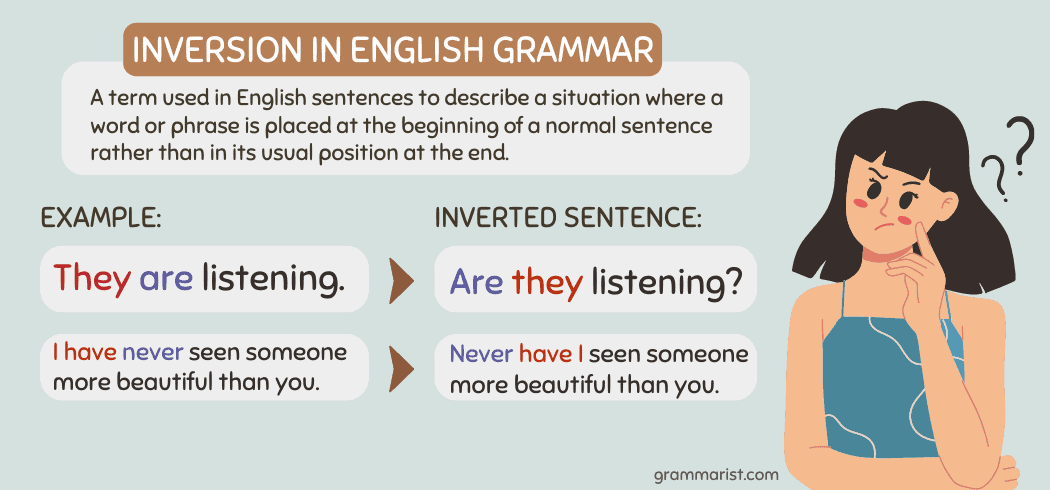Inversions are a grammatical tool you can use to change the emphasis of your sentences. The technique swaps a normal word order into something that helps draw attention to specific words and phrases.
Many native English speakers do this in their speech without being aware of actual inversion rules. But for English language learners, this can be difficult to master. Luckily, it is not a necessary technique to know to be understood, but it is helpful when you want to strengthen your speech and writing.
How Inversions Work

The order of your words is what makes an inversion work. Inversions are simply the “swapping” or “switching” of the subject and verb to reform the sentence. Inverting sentences emphasizes and adds variety to your sentence structure.
There are two main rules concerning sentence structure that you need to remember:
Rule #1
Use auxiliary verbs to help form the mood or voice of the main verbs in the sentence. The sentence should follow an auxiliary verb + subject + main verb word order.
The easiest way to practice this structure is to practice forming questions. In many English tenses, questions are formed simply through the inversion (or swapping) of the position of a subject and auxiliary verb.
For example:
- You have many new comments on your photography post.
- Have you many new comments on your photography post?
- He could have turned his work in on time.
- Could he have turned his work in on time?
Rule #2
Place what you want to emphasize at the beginning of the sentence.
- Never had she been so embarrassed by another person’s behavior.
- Rarely will you see the lake entirely freeze over.
Suggestions for Inversion Writing
Inverting sentences is a tricky task, especially for students new to the English language. However, its mastery can help clarify the tone you want your audience to pick up on in your writing.
Keep these tips in mind when applying inversion to your materials to help you create successful sentence structure each and every time.
Start a Sentence With the Past Participle
Using the word order of past participle + auxiliary verb + the subject emphasizes strong points you may want to make in your writing. This is a common technique used in poetry.
For example:
- Gone are our memories, lost in the storms of emotions and loss.
- Stolen was their time with one another.
Start a Sentence With a Negative Adverb or Phrase
Negative adverbs create a strong emphasis and are commonly used to form inversions.
For example:
- Seldom will you see students completing extra credit assignments.
- Hardly ever has she shown up on time.
Let’s Review
Sentence inversions help emphasize the tone of your speech and writing and provide a diverse and interesting sentence structure to your material. You don’t want to use it too often, but it is a good way to draw attention to specific information.
The best way to use an inversion correctly is to practice creating questions by switching the subject and verb and using auxiliary verbs. The use of past participles and negative adverbs is also a good tip to remember.
Use the inversion practices below to master these skills.